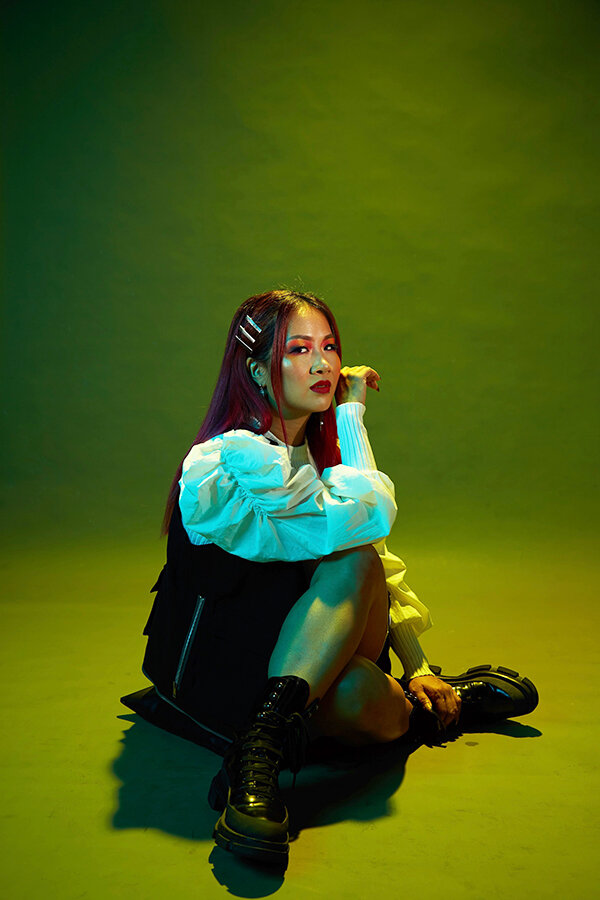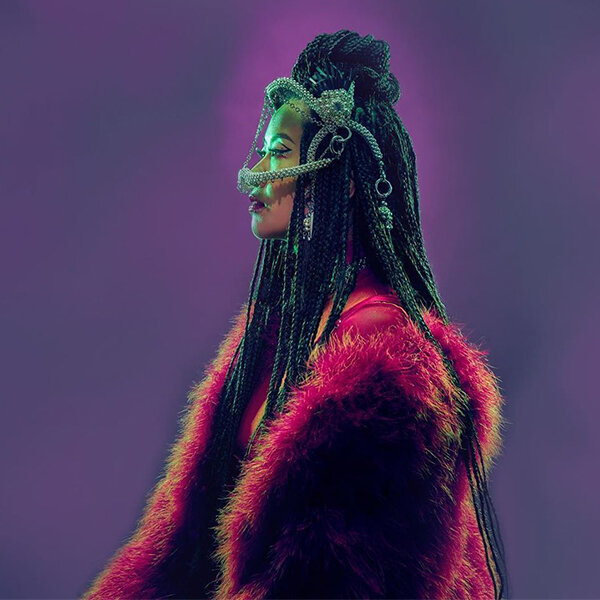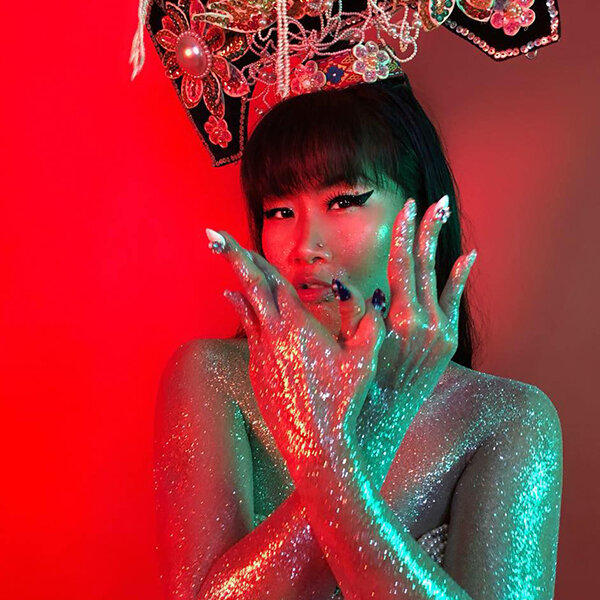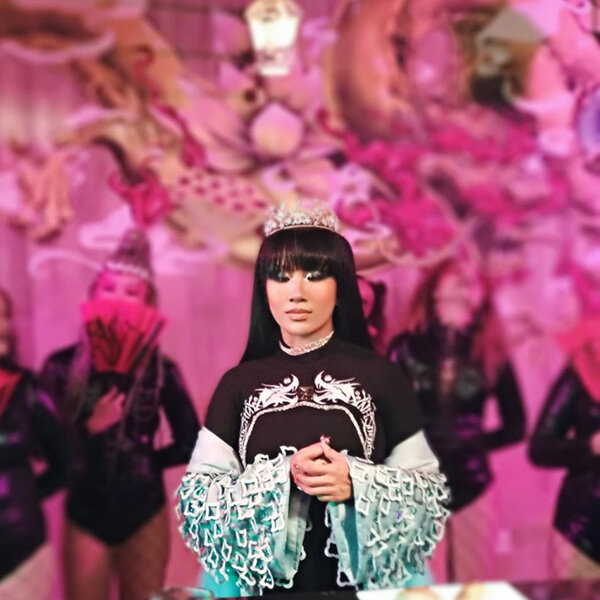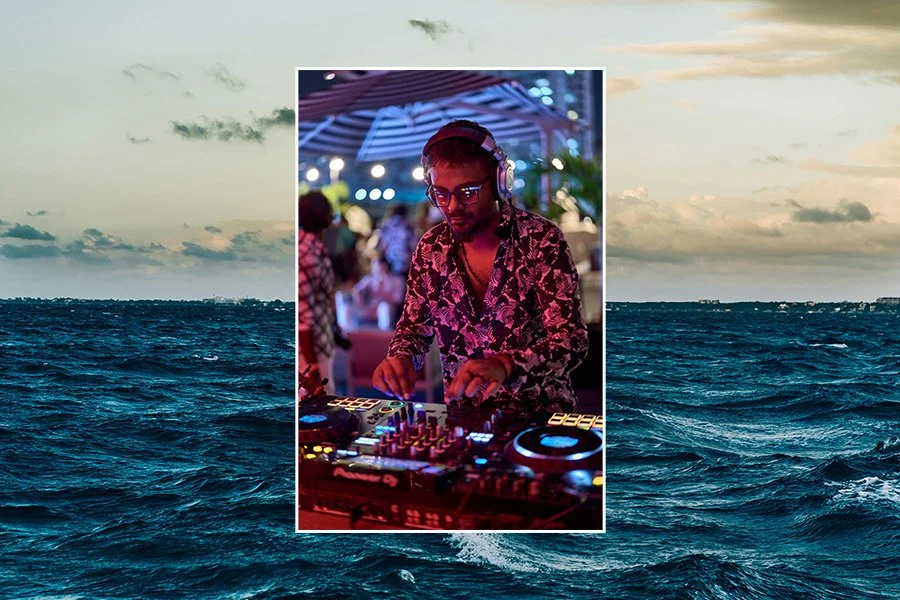The Reign Of A Far East Empress: Masia One Bridges Cultures While Being Her True Self
Bow down to the Far East Empress (Credit: Nusantara Records)
To rule is to have influence, and the wingspan of Masia One stretches far and wide. The apex personality commands respect from her throne carved by years of undying dedication and adventurous artistry, possessing one of the local industry’s most accomplished careers. Far from a culmination, her current arc indicates the cusp of a majestic rise most fitting of the self-anointed Far East Empress.
But don't let that title fool you into thinking that Masia One is out of touch with her surroundings. Through the years, I’ve seen the selfless trendsetter champion various pockets of the local music scene since returning to her country of birth. Google Masia One and you’ll easily find her international achievements racked up while living in the States (after growing up in Canada), which include collaborations with elite artistes like RZA, John Frusciante and Pharrell Williams. While worthy of acclaim, those are not the trophies I wish to focus on.
Masia One at the launch of Singapura Dub Club at Artistry in 2014 (Credit: Nicole Orehrepus Lee)
If memory serves me right, my first encounter of Masia One was sometime in 2014 at the now-defunct Artistry near Aliwal Street, where I found myself serendipitously submerged in the Jamaican hues and Rastafarian grooves of a Singapura Dub Club bashment. The reggae collective was founded by Masia One, and I soon learnt that it was a heartfelt passion of hers. Having spent a good amount of time finding herself in Jamaica, Masia One kick-started Singapura Dub Club to fortify the reggae scene here in Singapore, and it still pushes on till this day.
I discovered Masia One then as the magnetic vocalist of reggae band The Irietones, but as a solo artiste, she stands out even mightier. Boasting vocal versatility, Masia One excels as both a singer and a rapper, fitting naturally in a range of genres that she boldly explores in her repertoire. Her 2018 full-length, Far East Empress, flexed a tracklist that proved this with aplomb, from the tropical Caribbean pop of “Oh Na Na!” to the bare-knuckled hip-hop delivery of “Check Yo Levels”. If you’re lucky, you might’ve even stumbled upon the adept mic-master delivering freestyle verses on top of DJ sets in the bass community. Armed with a blazing stage presence to boot, Masia One is one remarkable show-woman with no equal.
Masia One’s latest single with DJ ALX has achieved nationwide fame (Credit: Nusantara Records)
Her latest conquest assumes the form of the conceptual new single, “You’ll Only Love Me (When I’m Gone)”, produced by DJ ALX. The official theme song of national television series, Ti Tou Dao, that tells the story of the Chinese Wayang (street opera) community of the 1940s, it helped stretch Masia One’s status even further as she plunged into the mainstream market; she even sang it bilingually to connect with Mandarin-speaking listeners. Inspired by the story of a real-life Wayang doyenne, Masia One finds a way to bridge the struggles of the past with her challenges faced in the present as a niche, female artiste who dares to break the mould.
I was fortunate enough to land an interview with the Far East Empress herself, where she revealed the story behind the hit single, her various contributions to the scene (including making her very own jerk sauce), lessons learnt in Jamaica, and going head-to-head with the patriarchy embedded in the music industry. Hear ye, Masia One speaks.
“I think I’ve always been re-inventing myself as an artiste and coming up with zany ideas.” (Credit: Nusantara Records)
Hi Masia. Hope you’ve been staying safe and sane in these bizarre times. Has this lockdown period given you a new perspective on life as an artiste?
Whenever I watched period movies, I was always terrified by the dark ages where people lived in castles and faced the bubonic plague. I mean if we need to be home quarantined, there is no better time in human history to live than with plumbing, electricity and the Internet, so I’m grateful [laughs].
I think I’ve always been re-inventing myself as an artiste and coming up with zany ideas, so this time hasn’t really changed me much from day to day. One of my biggest realisations is reconnecting with how much imagination and creativity can help businesses outside of my artiste bubble. I’ve been helping out a few friends in sectors outside of arts and entertainment, with everything from creating a TikTok account as a burrito, to singing rap and EDM songs about kimchi rolls, and even rap coaching these girls that invented a Coronavirus game.
Reggae singer, rhyme flinger, sauce slinger, vibe bringer – to say that you wear numerous hats is an understatement. What’s your secret to doing it all?
My cycle of activities actually complement and feed one another. I’ll write hip-hop songs that come lyrically aggressive and stringent rhythmically, and balance that with singing reggae music which reconnects me with the irie life and exploring melodies and rhythms that are purposely not perfectly hitting the syncopated beat. I follow this with creating Suka Suka Sauce as a platform to share music through food, building a distribution channel to share music. Now with music of all flavours, food and culture, the good vibe comes naturally. I don’t look at it as numerous hats. I see it as ‘natural progression’.
Yes, Masia One is also in the business of making a mean sauce (Credit: Suka Suka Sauce Facebook page)
Speaking of Suka Suka Sauce, can you tell us more about it?
The staple that got this all started was Jamaican Jerk Chicken. With Suka Suka Sauce, I cut extra garlic, onions, chilli padi (I didn’t make the sauce too spicy anticipating that expats would be the early adopters, but a hot sauce in the works), and a splash of rum. Marinate overnight, stick it in the oven to bake and you have a seriously authentic-tasting Jerk!
With mounting concerns of health at this time, I focused on the fact that the sauce has no preservatives, is 100% all-natural (no e-numbers), low in sodium and sugars and is vegan-friendly. I’ve been exploring vegetarian recipes including a Suka Suka Lentil Burger with lentils marinated with the sauce, spread with a Suka Suka-flavoured yoghurt to replace ketchup or more unhealthy alternatives. Sandwiched between bread, crispy lettuce and tomatoes, the texture of the lentils and smoky flavour of the sauce is an amazing combo.
I have my Venezualan mother-in-law-to-be staying at my home since the lockdown so she’s been using Suka Suka sauce to make Arepas, with the sauce mixed right into the corn dough of these crispy pockets containing cheese or tuna. I make an easy dipping sauce with Suka Suka by diluting it with water or olive oil. It’s like a Latino Suka Suka curry puff.
Finally, for those that don’t cook, mix Suka Suka with mayo and dip nacho chips in it – it’s pretty addictive.
“When I moved to the countryside in Westmoreland [Jamaica], I learnt the importance of understanding the natural flow and rhythm of life.” (Credit: Masia One Facebook page)
The sauce is, like many things in your career, an extension of your reverence for Jamaican culture. What key philosophies did you take away from there, not necessarily as a musician but a person?
I think it’s often difficult for Singaporeans to relate to my passion for Jamaica since it’s so geographically far away (and I have been asked, “Where in Africa is Jamaica?” It’s in the Caribbean, kiddies), but I suppose if you close your eyes and remember a place where you personally felt the most like yourself, the most inspired and where you enjoyed life with no agenda other than to live – this is how I felt in my five years living on and off in Jamrock.
I learnt the importance of re-connecting to my authentic root while I was in Kingston and teaching kids. In places where people have nothing but their voices to sing or their bodies to dance, you can see raw creation from nothing to something. There is no stylist to work your image or audio engineer to splice your voice; just your talents and the will to let your unique self shine. There is no self-help book to ‘find your passion’ when your passion is all you’ve got. There is no ‘how to be confident’ seminar when you’re born to be a voiceless kid from the ghetto. You either believe in yourself to survive or get swallowed up by the system.
When I moved to the countryside in Westmoreland, I learnt the importance of understanding the natural flow and rhythm of life. Whenever we fight against the change because of what we insist we want, whether it’s ego, control or vengeance, things fall apart. Before I moved back to Singapore, I spent nights sitting cliffside in Negril. I caught myself worrying if I had to give it all up because I heard Singapore wasn’t a place for music, or if I would ever be accepted in a place where I looked the part, but never grew up in. As I watched those majestic waves crash in and out against giant boulders and stared into the depths of the blackest oceans, I would realise how insignificant my worries were in the grander scale of nature and how simple my dreams and wishes were, in comparison to how everything in the universe finds a way to hang in a balance.
“One love is an easy term to throw around, but it takes time to build a deeper appreciation for diversity and the reward reverberates throughout a society.” (Credit: Nusantara Records)
The scene’s definitely accepted you, I can vouch for that. How do you think the local growth of reggae has fared in recent years?
I think there has definitely been growth as we see more crews like Afrodisia, Singapore Soul Club, Dub Skank’in HiFi and Lion Steppaz Sound hosting events, and the dancehall crews have been teaching to a growing number of students. It also took me a few years to understand the local perception of reggae and the underground scene before I could plan a direction to take Singapura Dub Club. I founded Dub Club with the belief that there was a lot of stress in the hardworking population and reggae music would be the perfect solution to create island vibes for reconnection and relaxing. Asians are risk-averse, and there are stereotypes and prejudices that create obstacles to accepting a subculture.
I was told by a Singaporean manager that “reggae is for poor people”, so I targeted upscale venues to host soundsystem events including an epic dancehall party in collaboration with AOS at the top of Marina Bay Sands’ CÉ LA VI, and our monthly Dub Club on the rooftop of Potato Head Folk (I took the idea of ‘atas’ quite literally). Grab uncles told me that reggae was “Bob Marley, smoke smoke”, so the next step was holding Suka Suka Sunday cookouts, so there’s a realisation that there is much more to a culture. An auntie might say, “I don’t like or listen to this type of music”, but if you tell her you have a Caribbean-style spicy chicken, she’s probably more likely to try that.
One love is an easy term to throw around, but it takes time to build a deeper appreciation for diversity and the reward reverberates throughout a society.
“I would love to share with girls going into a male-dominated rap game how to deal with sexism… you know, shit girls are actually going to face when dealing with the music industry.” (Credit: Masia One Facebook page)
Hip-hop is, of course, just as influential towards your identity. Unfortunately, there is still a very clear disparity between genders within the emcee circuit. Why do you think that’s the case?
Hip-hop is my first love, and I still consider myself an emcee first and foremost. When you see emcee bookings for Singapore shows or there is a rap interlude on a national day song, you will only ever see males represented. One reason is that here rap is seen as a fashion and image more than as a culture, so the imaging is associated with tough urban males, while the girls can sing the sultry r&b hook. The patriarchy of the ‘good girl’ image is still firmly embedded, with the notion of ‘edgy women’ tied to their winged eyeliner looks more than the strength of their accomplishments in hip-hop.
On that note, we have a lack of female rap role models, but an obscene amount of lady makeup influencers. True story: I tried to organise an all-female hip-hop celebration and almost every femcee I called that used to rap on the steps of Far East Plaza are now only into making YouTube makeup videos. I don’t blame them because women that have been a part of hip-hop as long as I have are no longer in their 20s, and the media does not like to sell women to girls. Popular magazines want to show the next big, teen hip-hop star, with a lack of diversity in the HERstories told.
For example, I would love to share with girls going into a male-dominated rap game how to deal with sexism, how to prevent exploitation of your body in the name of opportunity – you know, shit girls are actually going to face when dealing with the music industry. With fewer female role models and so many potential dangers, of course there aren’t many female emcees coming up in Singapore, and that cycle continues in the public’s perception that “girls don’t rap”.
Besides, it’s been hard to get in the battle ring with some of these male emcees. I don’t think boys like losing to a girl. <3
“I don’t have any apprehensions toward writing a pop song because to me, pop just means (pop)ular music." (Credit: Masia One Facebook page)
Do you get into a certain headspace before you dive deep into that songwriting rabbit hole?
I have written songs backstage at an open-mic, in a top-of-the-line studio working in L.A., or even now locked in my apartment with my dog sleeping on my feet because of the COVID situation. Every environment inspires different songs so I’m not that picky about the surroundings. It’s more important to practise finishing a song. So many artistes are so neurotic over the perfect inspiration to write, or refining a song they’ve started to perfection and never finish due to self-criticism. I once had a convo with Marsha Ambrosia of Floetry while writing at Aftermath. She writes and records one song every day of her life and I realised songwriting is also about muscle memory. An athlete will run to get better, a violinist will practise until the song is committed to memory. Songwriting is no different – some days will produce great songs and some days won’t. The most important thing is learning how to finish and be committed to your craft.
Let’s talk about your latest release, “You’ll Only Love Me (When I’m Gone)”. Did you face any challenges approaching the song, considering it’s quite a departure from what most of your listeners would be familiar with?
Initially, the task for producer DJ ALX and I was to write a song that might make Wayang Chinese street opera palatable for a younger audience, but when we presented our Trap Wayang ideas (heavy trap songs with Wayang samples), I think it was too progressive for the corporates who quickly requested a pop song. I related my journey with that of this Wayang actress that the show is about and penned lyrics that are bittersweet, reflecting on the incredible memories of a colourful life chasing a craft you are most passionate about while realising the tendency of society to celebrate nostalgia and heritage cultures only when they are gone.
I don’t have any apprehensions toward writing a pop song because to me, pop just means (pop)ular music. I believe a good song and good lyrics can be expressed in any genre, so I opened a #B4ImGone challenge up to artistes around the world and have received West Coast rap, French reggae, Brooklyn saxophone versions and even one from Mongolia! I hope this inspires more creatives to break down their barriers as well as encourage my followers to discover the projects of these participating artistes.
“I’ve heard criticism like ‘Who is the bloody Chinese girl that go vacation to Jamaica then come back and think she’s Rasta?’” (Credit: Masia One Facebook page)
How do you feel about the song getting such vast nationwide exposure, given that it’s also reached the ears of Mandarin-speaking listeners?
I guess that was my biggest challenge! Once the show had to be dubbed in Chinese, I sang a Chinese version and my Mandarin language skills are at the level of an eight-year-old (I left Singapore after Grade Two). My right-hand woman, General Ling, penned the lyrics and I had to muster the courage to sing it, fearful of the scrutiny I may attract from Chinese speakers out there that might smell the kentang in my accent. Incredibly, the Chinese version hit 5,000 views almost immediately and is doing better than the English version. Never try, never know.
In your press release, you stated that you could relate to the protagonist of Ti Tou Dao, in that you also faced “similar struggles in legitimising and unsung appreciations” through your career. Are these struggles still present for you today?
I think the struggle was more real when I first moved to Singapore because there was a lot I didn’t understand about the societal norms here. I’ve heard criticism like “Who is the bloody Chinese girl that go vacation to Jamaica then come back and think she’s Rasta?” or “Why are you putting on that American accent, you think you’re better than me?” or even “She worked with Dr. Dre, RZA and John Frusciante? As if!”. I think naysayers can be expected, but being totally misunderstood when you’re really being your authentic self is another thing.
I’ve put in five years now building from the ground up, working with a great team at Nusantara Records and growing the audience beyond the Lion City to Indonesia, Malaysia and Burma where I have a bigger following and engagement so it’s not as frustrating. That said, I’m still waiting for the opportunity to really show what I’m capable of on home soil. These sentiments are echoed in the lyrics of the song “Crave me, remember me, love me – I will never let you down”.
“I think naysayers can be expected, but being totally misunderstood when you’re really being your authentic self is another thing.” (Credit: Masia One Facebook page)
Wayang represents a tradition in much need of preservation. As a performer yourself, do you see yourself as a stickler for tradition or an innovator who bends the rules?
I think there is a need for both, and there are people who naturally side with one or the other. You need the purist who understands the root and history of the culture, and the finer points of the craft. You also need the innovator who understands the signs of the times, otherwise insular purity will never share its message with a greater audience.
I try my best to exist somewhere in the yin-yang of this balance; taking the time to research, reflect and re-root myself in the authenticity of a craft, but always letting what my friends call “Masia’s idea turrets” flow. When I released “You’ll Only Love Me (When I’m Gone)”, I called up my friend Truf a lot who’s 100% a hip-hop head just to hear him berate me about not rapping more and how I’ve gone soft. It’s a challenge and balance I love. To quote Maya Angelou: If you don’t know where you’ve come from, you don’t know where you’re going. I have respect for the past, but I’m a person of the moment.
Truly, this release has shown that you’ve truly embraced your roots since coming back to Singapore. What can we expect next from the rise of the Far East Empress?
Trap Wayang songs and more Suka Suka Ayam Bakar reggae. <3
(Credit: Nusantara Records)
To find out more about Masia One, visit her official website. You can listen to her material streaming on Spotify.
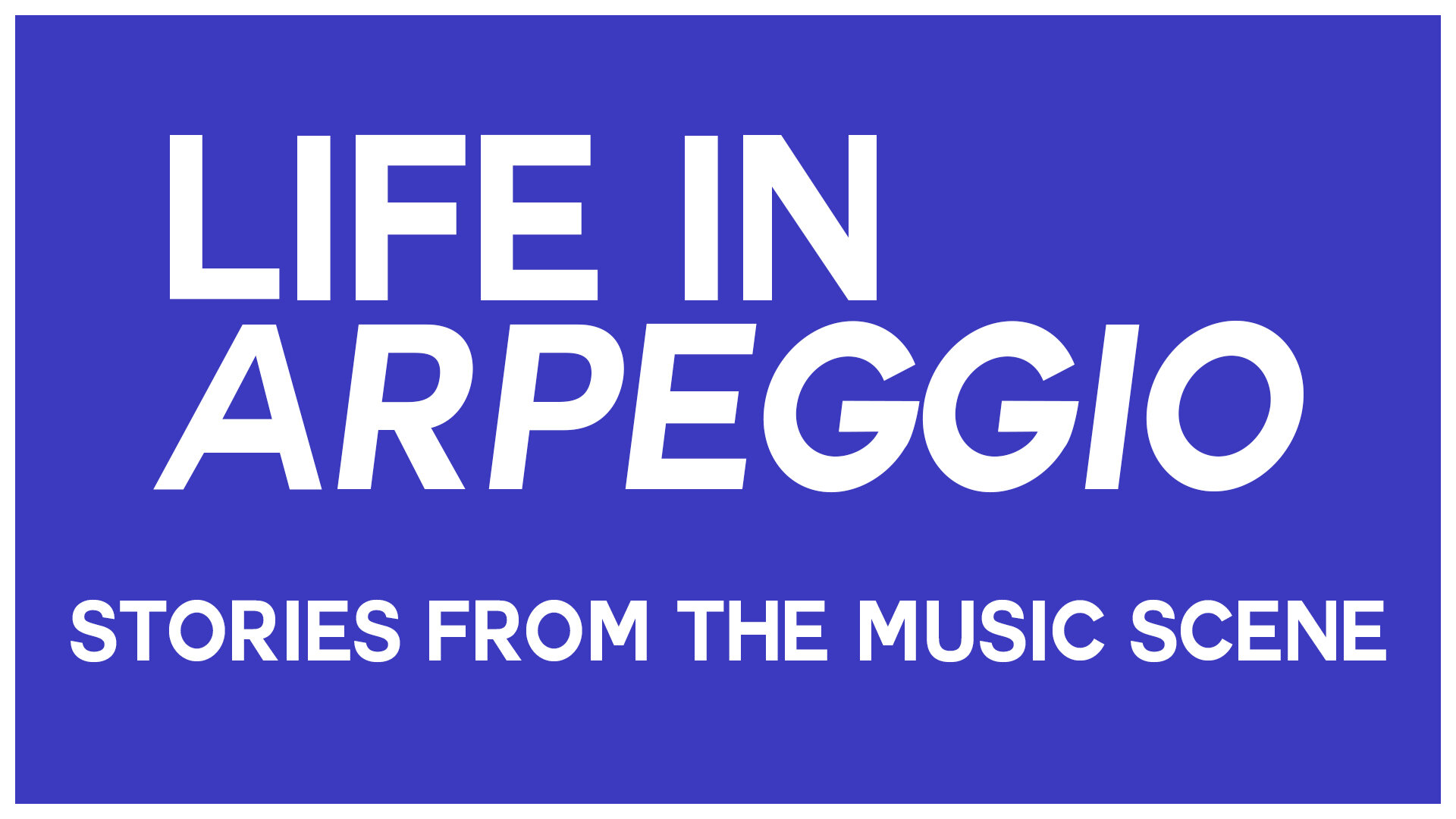

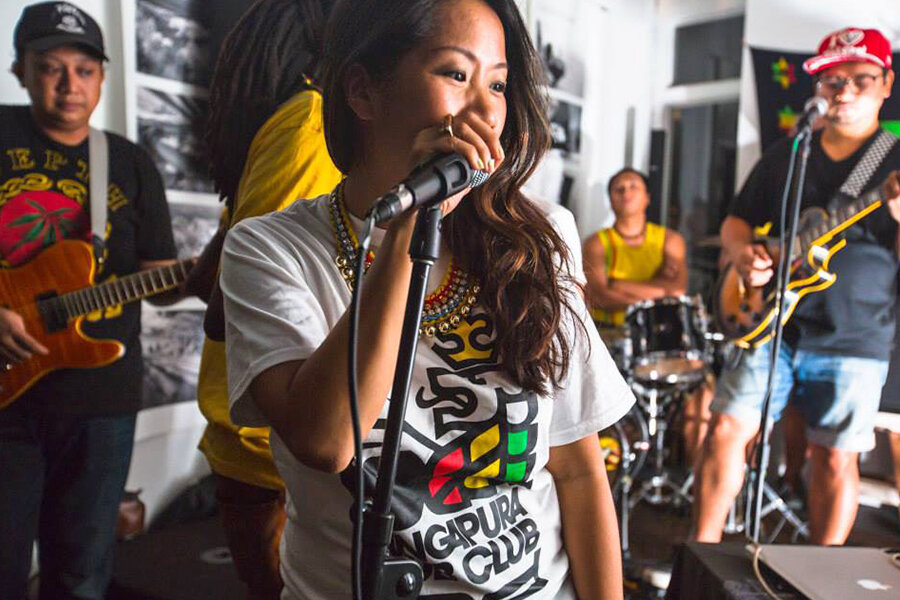
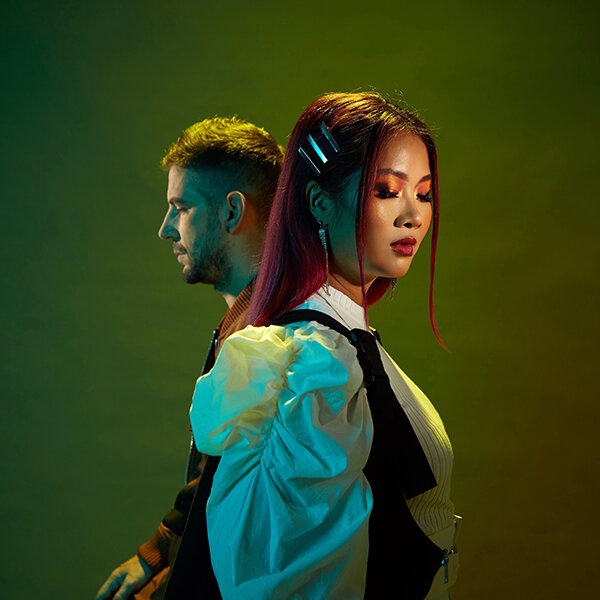

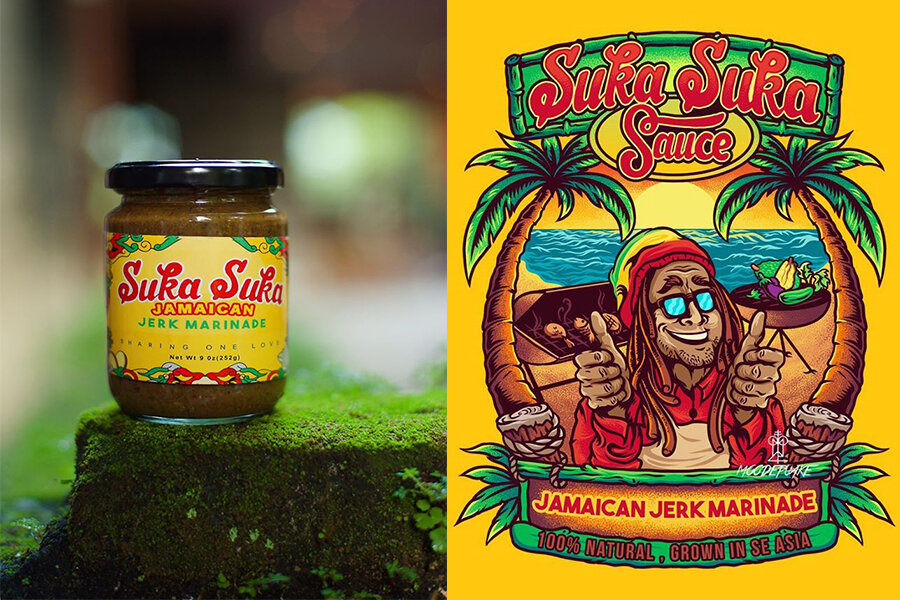
![“When I moved to the countryside in Westmoreland [Jamaica], I learnt the importance of understanding the natural flow and rhythm of life.” (Credit: Masia One Facebook page)](https://images.squarespace-cdn.com/content/v1/5bcc4044348cd95e1711b02c/1591852685139-K9HQ113MUKQ69PNO5WTE/life-in-arpeggio-masia-one-interview-local-musicians-hip-hop-reggae-pop-singapore-06.jpg)
